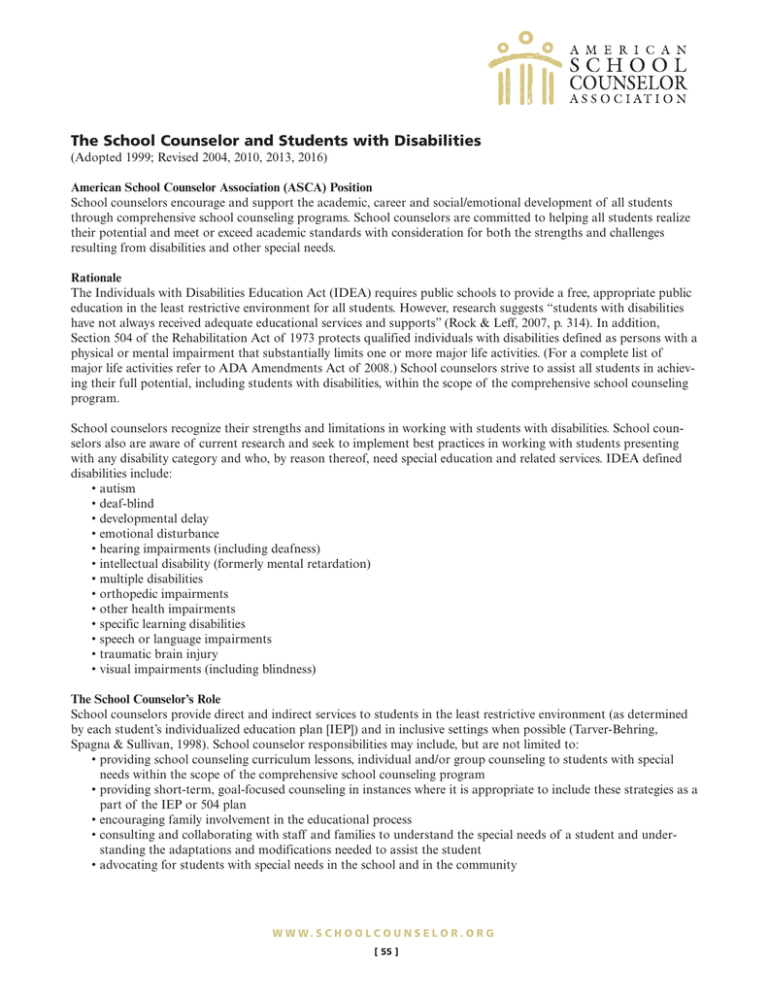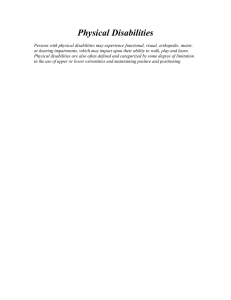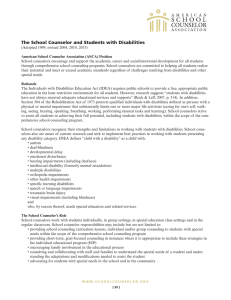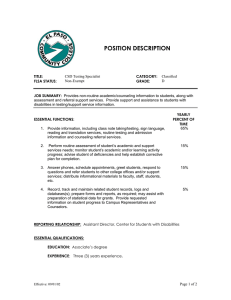Students with Disabilities - American School Counselor Association
advertisement

The School Counselor and Students with Disabilities (Adopted 1999; Revised 2004, 2010, 2013, 2016) American School Counselor Association (ASCA) Position School counselors encourage and support the academic, career and social/emotional development of all students through comprehensive school counseling programs. School counselors are committed to helping all students realize their potential and meet or exceed academic standards with consideration for both the strengths and challenges resulting from disabilities and other special needs. Rationale The Individuals with Disabilities Education Act (IDEA) requires public schools to provide a free, appropriate public education in the least restrictive environment for all students. However, research suggests “students with disabilities have not always received adequate educational services and supports” (Rock & Leff, 2007, p. 314). In addition, Section 504 of the Rehabilitation Act of 1973 protects qualified individuals with disabilities defined as persons with a physical or mental impairment that substantially limits one or more major life activities. (For a complete list of major life activities refer to ADA Amendments Act of 2008.) School counselors strive to assist all students in achieving their full potential, including students with disabilities, within the scope of the comprehensive school counseling program. School counselors recognize their strengths and limitations in working with students with disabilities. School counselors also are aware of current research and seek to implement best practices in working with students presenting with any disability category and who, by reason thereof, need special education and related services. IDEA defined disabilities include: • autism • deaf-blind • developmental delay • emotional disturbance • hearing impairments (including deafness) • intellectual disability (formerly mental retardation) • multiple disabilities • orthopedic impairments • other health impairments • specific learning disabilities • speech or language impairments • traumatic brain injury • visual impairments (including blindness) The School Counselor’s Role School counselors provide direct and indirect services to students in the least restrictive environment (as determined by each student’s individualized education plan [IEP]) and in inclusive settings when possible (Tarver-Behring, Spagna & Sullivan, 1998). School counselor responsibilities may include, but are not limited to: • providing school counseling curriculum lessons, individual and/or group counseling to students with special needs within the scope of the comprehensive school counseling program • providing short-term, goal-focused counseling in instances where it is appropriate to include these strategies as a part of the IEP or 504 plan • encouraging family involvement in the educational process • consulting and collaborating with staff and families to understand the special needs of a student and understanding the adaptations and modifications needed to assist the student • advocating for students with special needs in the school and in the community W W W. S C H O O L C O U N S E L O R . O R G [ 55 ] • contributing to the school’s multidisciplinary team within the scope and practice of the comprehensive school counseling program to identify students who may need to be assessed to determine special education or 504 plan eligibility • collaborating with other related student support professionals (e.g., school psychologists, physical therapists, occupational therapists, special education staff, speech and language pathologists) in the delivery of services • providing assistance with developing academic, transition and postsecondary plans for students with IEP’s and 504 plans as appropriate Inappropriate administrative or supervisory responsibilities for the school counselor include but are not limited to: • making singular decisions regarding placement or retention • serving in any supervisory capacity related to the implementation of the IDEA • serving as the school district representative for the team writing the IEP • coordinating, writing or supervising a specific plan under Section 504 of Public Law 93-112 • coordinating, writing or supervising the implementation of the IEP • providing long-term therapy Summary The school counselor takes an active role in student achievement and postsecondary planning by providing a comprehensive school counseling program for all students. As a part of this program, school counselors advocate for students with special needs, encourage family involvement in their child’s education and collaborate with other educational professionals to promote academic achievement, social/emotional wellness and college/career readiness for all. References ADA Amendments Act of 2008, Pub. L. No. 110-325, 122 Stat. 3553 (2008). Retrieved from https://www.congress.gov/110/plaws/publ325/PLAW-110publ325.pdf. Individuals with Disabilities Education Act. Public Law 108-446 108th Congress http://www.gpo.gov/fdsys/pkg/PLAW-108publ446/html/PLAW-108publ446.htm. Rock, E., & Leff, E. (2007). The professional school counselor and students with disabilities. In B. T. Erford, Transforming the School Counseling Profession (2nd ed.), 314-341. Tarver-Behring, S., Spagna, M. E., & Sullivan, J. (1998). School counselors and full inclusion for children with special needs. Professional School Counseling,1(3), 51-56. Resources Oesterreich, H. A., & Knight, M. G. (2008). Facilitating transitions to college for students with disabilities from culturally and linguistically diverse backgrounds. Intervention in School and Clinic, 43, 300-304. Redmond, S. M., & Hosp, J. L. (2008). Absentee rates in students receiving services for CDs, LDs, and EDs: A macroscopic view of the consequences of disability. Language, Speech, and Hearing in the Schools, 39, 97-103. W W W. S C H O O L C O U N S E L O R . O R G [ 56 ]




